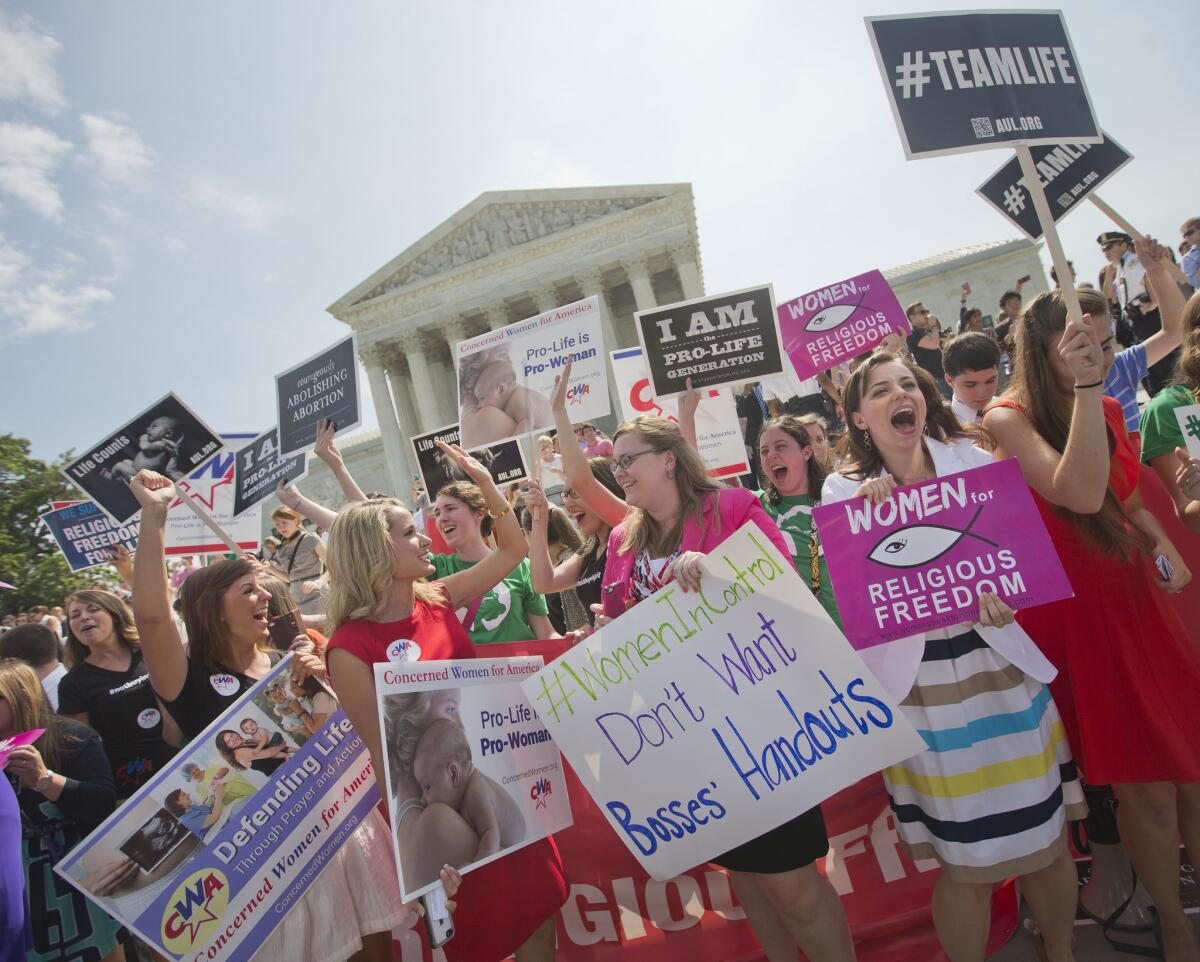Democrats pick up GOP tactic: Campaign against Supreme Court

Half a century ago, Richard M. Nixon and other Republicans boosted their political prospects by running against the Supreme Court. Now it’s President Obama’s turn.
Within hours of the high court’s decision Monday that at least some companies can use religious rights to exempt themselves from paying for health insurance covering contraceptives, Democrats were seeking to energize voters, raise money and attract support by highlighting the case.
White House press secretary Josh Earnest set the tone, saying that the ruling “jeopardizes the health of women.”
“President Obama believes that women should make personal healthcare decisions for themselves rather than their bosses deciding for them,” Earnest said.
Democratic candidates across the country issued statements echoing that sentiment.
Sen. Kay Hagan of North Carolina, for example, who is one of the Democrats’ most endangered incumbents this year, called it “shameful that a woman’s access to contraception is even up for debate in the year 2014.”
“The choice about whether to use birth control should be between a woman and her doctor, not her boss, and no employer should be allowed to interfere with a woman’s access to contraception,” Hagan said.
White House officials said Obama would ask Congress to act to protect female employees’ access to contraceptives.
Legally, that avenue is open because the court’s decision in Burwell vs. Hobby Lobby said the religious rights at issue stemmed from a federal law, the Religious Freedom Restoration Act, not the Constitution.
There’s little chance that a divided Congress will act on any proposal to amend the law. But a debate would highlight the difference between the two parties on the issue, which Democrats eagerly want to do.
Party strategists see the issue as one that could mobilize key groups of voters in this fall’s election, when Democratic control of the Senate could turn on a handful of votes in three or four hotly contested states.
The decision “puts contraception and the GOP’s determination to limit women’s access to preventive health services back into the national political debate,” Stanley B. Greenberg, a pollster who advises the House Democratic leadership, wrote Tuesday.
Presidents of both parties have criticized Supreme Court decisions they disagree with and have sometimes used the justices as foils for sustained political campaigns.
For most of the last half-century, however, Republicans have been the main practitioners. Denunciations of liberal decisions on civil rights and criminal law under Chief Justice Earl Warren in the 1950s and 1960s formed a key part of the GOP strategy that converted the South into a Republican stronghold and solidified Nixon’s “silent majority.”
Today, the political dynamics have turned around. The Supreme Court stands with the House of Representatives as one of the few power centers in Washington with a Republican majority. The court’s five conservatives, all appointed by Republican presidents, have frequently been at odds with the Obama administration.
That shift has created some cognitive dissonance in Washington.
Republican politicians who came of age denouncing “judicial activism” have learned a new appreciation for the court’s role as a check on the executive branch. And Democrats who used to warn about politicians interfering with judicial independence have had to pick up a new vocabulary.
But politicians are nothing if not flexible. Voters have changed their views as well. Democrats, who used to give the justices high marks in opinion polls, increasingly have turned critical, contributing to a drop in the public’s overall estimation of the court.
Democratic anger at the Supreme Court flared politically in 2010 after the Citizens United decision opened the way for corporations to take part in political campaigns. Now, the justices’ decision in the contraceptive case has kicked the volume up several notches.
The decision excited partisans of both parties. For many Republicans, the ruling marked a victory in a campaign to push back against what they see as the Obama administration’s assaults on religious liberty. Religious conservatives, who form a key part of the Republican coalition, expressed great satisfaction with the ruling.
But anger almost always trumps satisfaction in politics, and Hobby Lobby has the potential to anger two important, overlapping constituencies for Democrats: single women and ideological liberals. Moreover, it comes as Obama and his congressional allies have been trying to mobilize those groups in the run-up to the midterm election.
For each of those constituencies, the court’s decision fits into a line of argument that Democrats already have honed.
Ideological liberals already have become allergic to the idea that the Supreme Court has been expanding the rights of corporations. The Citizens United decision involved free speech rights for corporations. Now, in Hobby Lobby, the court has said corporations can exercise religious rights.
Justice Samuel A. Alito Jr. went to considerable length to defend that idea in his opinion for the court.
“A corporation is simply a form of organization used by human beings to achieve desired ends,” he wrote. “When rights, whether constitutional or statutory, are extended to corporations, the purpose is to protect the rights of these people.”
But as the liberal justices of the 1960s often found, such legal subtleties seldom survive a political campaign.
Meantime, because it potentially restricted access to contraceptives, the court’s decision feeds into the “war on women” theme that Democrats repeatedly have used to their advantage.
Issues about access to healthcare and contraception have particular salience for unmarried women, Democratic strategists say, and they form a major Democratic voting bloc – one that has lagged behind its usual level of support this year, polls by Greenberg and others have shown.
“The War on Women has repercussions for Republicans,” the liberal blogger Markos Moulitsas wrote on his popular Daily Kos blog. He predicted that the court decision would provide “an issue that galvanizes an ill-performing Democratic base” group.
Whether that will happen won’t be known for months; Supreme Court decisions only occasionally become top-tier election issues. But for now, the high court’s conservatives have handed Democrats an opportunity to go on offense. After weeks of being on the defensive, that’s an invitation the White House and its allies have cheerfully accepted.
david.lauter@latimes.com
For more on politics, follow me on Twitter @DavidLauter.
More to Read
Start your day right
Sign up for Essential California for news, features and recommendations from the L.A. Times and beyond in your inbox six days a week.
You may occasionally receive promotional content from the Los Angeles Times.







